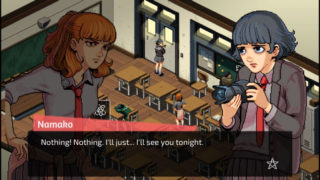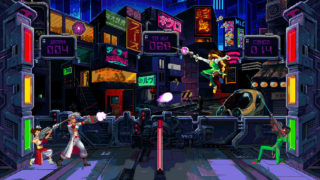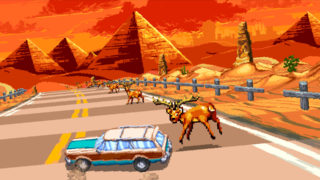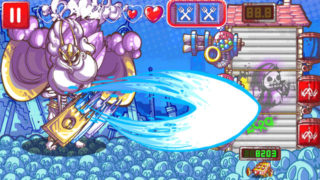Although it is disheartening, when your game doesn’t sell, Brandon Sheffield, Creative Director at Necrosoft wanted you to know that this isn’t the end. Developers shouldn’t give up and think they missed their one shot. At Casual Connect USA 2017, Brandon stated that if you’ve got a game that’s portable to modern platforms, you’ve got a revenue stream. If not from consumers, it will come from platforms. By using examples from several companies, Brandon shared how Necrosoft sells versions of current or older games to new platforms in order to fund new projects in the session below.
DOWNLOAD SLIDES
Brandon Sheffield is the Creative Director at Necrosoft Games. While focusing on the artistic direction of the products is a big part of what he does, it’s certainly is not limited to that.
“I also do business development/marketing/design/writing/production.” noted Brandon. “Everyone else works harder than me, but I get more job titles. I guess that’s what happens when you’re the boss! Necrosoft is a company I formed after quitting Game Developer magazine – if it fails, it’s my fault.”

Brandon laughed and added that his favorite thing about his job is when things go right. “I like when we make a good deal, or a design breakthrough, or a prototype works as designed, or somebody says something nice about us,” he said. “But in general, I like being able to work on multiple projects at once, all of which are owned by us, without fear of a publisher or platform changing what we want to do. That’s nice!”
It’s not so easy, however, to always manage a variety of personalities in a company that’s spread out all over the globe. “I can’t just sit down and have a talk with someone about how we interact, it’s mostly got to be via text or Skype,” said Brandon. “I’ve been gradually overcoming these challenges by shifting personnel around, and working with people who are naturally inquisitive and also pretty keen to work by themselves. When we’re all asking questions, and all doing our own work, we all know what we should be doing, and the machine runs smoothly.”
Going from Writing to Game Creation
Brandon has been a game journalist for Game Developer magazine and other publications. Today, Brandon says that this makes him mad at poor game journalism more than anything else.
“It also makes me more understanding when folks inevitably get stuff wrong when interviewing me or writing about something I’m doing. I just accept that that’s the new version of the truth now, because there’s not much to be done about it. My Wikipedia article, I don’t know who wrote it, but I don’t think there’s a single sentence without an error in it,” details Brandon. “I do also think it’s helped me when it comes time to pitch to journalists – I can generally come up with a few angles for coverage that mean they don’t have to think about why my game or my story is interesting, because I’ve already provided some ideas in that regard. Unfortunately game journalism has almost no affect on game sales anymore, so this skill is largely wasted!”


Going into game development happened when Brandon got bored of writing about games and wanted a new challenge. “Sony came along needing some PlayStation Mobile games, so it was the perfect timing,” said Brandon. “I just built a team, and off we went. Of course, I can’t help but get back to writing every once in a while! And I also wind up writing game text for other people too, I’ve done quite a lot of contract work in that regard.”

He notes that the now defunct PlayStation Mobile had the potential to be something great. “It essentially picked up where Xbox Live Indie Games left off. Unfortunately it wasn’t very well supported, and the toolset was on the older and clunkier side, so making things for it was non-trivial. They eventually got Unity support, but it came pretty late,” detailed Brandon. “But for us, it was our chance to be on real hardware, with the backing of Sony and their social media platforms, and because of that we were set down the path to have one and a half completed games by the end of the platform. So it was great for us.”
A Plethora of Creations
Brandon’s creative arch also included a web comic series called No Girlfriend Comics. There was a very personal reason for writing it, but it also helped him grow as a writer.
“Working on No Girlfriend Comics began as a sort of catharsis during a breakup, but wound up helping me find my voice as a writer of dialog, at least in comic form!” said Brandon. “This was refined and enhanced during my second comic collaboration with Dami Lee, Hot Comics for Cool People. I’ve since found writing dialog, and fictional narratives in general, to be much easier. I certainly did not predict that!”


His game creations have expanded out to include the eccentric, like Oh Deer!. “The idea for Oh, Deer! was born when my friend Ian Adams said “Hey, you know those ‘deer xing next 5 miles’ signs? Wouldn’t it be crazy if the road was just flooded with deer when you saw that?” detailed Brandon. “We then discussed each making our own version of that concept, and I got set on making a pseudo 3D racer along the lines of Outrun. After many false starts, and attempts with various different programmers, we wound up getting to the Beta we have today. At one point we even called up the programmer of Road Rash to figure out how to do the roads properly.”
Necrosoft has released a catalog of titles that they’ve brought to a variety of platforms, a key to Necrosoft’s continued solvency. “Essentially our business model is to make a small version of a game for a new platform that will pay us, as we did with Gunhouse and Oh, Deer! on PlayStation Mobile,” said Brandon. “Then we find other small platforms to pay us to bring the game there. Then we keep going until the game is massively more robust, polished, and larger than the original game. We release this version on wider platforms (like iOS, or console). But we don’t stop there! We continue taking small chunks of money to bring the games with new features to new platforms. This means we’re always juggling around various exclusivity periods, and we’re having to support a lot of different stores, but with each launch we learn more about launching a game, and the whole process has gotten easier.”
Testing for Focus
For Brandon and Necrosoft, the timing over when to test is shifting. The team tends to start really testing when games reach key pivot points.
“We test when we’ve got something we’re unsure of, really, or whenever there’s a gathering of game developers and we figure we just might as well,” said Brandon. “We’ve definitely had times where it was clear nobody understood what we were trying to do, and had to find ways to fix that.”

“With our game Gunhouse, we used to have the puzzle portion of the game over on the left-hand side,” he continued. “Since it was coming out for Vita, we figured people would use their left thumb or finger to move stuff around, since that’s where the d-pad is. But since it was a touch screen game, and most people are right handed, people actually just used their right index finger, and covered up the entire rest of the screen with their hand. We flipped the entire game, and it worked a lot better!”
Interesting Times
On his personal life, Brandon describes himself as a collector of “media and objects”. He says he goes into thrift stores and looks for special items to pick up.
“I look for things like a unique leather jacket, vintage sci-fi books. Cambodian karaoke laserdiscs, freestyle records, or un-streamable VHS movies,” he noted. “I have a lot of oddities in my house, and another hobby of mine is re-organizing my place to display and access them properly. I’ve got about 2,000 games, 700 records, a few hundred DVD and Blu-rays, so it can be a challenge.”

Looking to the future, Brandon sees major overhauls to the way that the industry works. “Trends I see are regrets from overspending on VR, the evolution of the mobile business model, the rise and fall of the indie publisher, and the almost complete change in editorial power from web sites to Youtubers and Twitch streamers,” Brandon notes.
When asked how Necrosoft would deal with this, he responded, “We are incorporating very little of this into our future plans. We’re doing our best to carve out a space in which these changes won’t affect us too much.”
“For now, we’re going to keep on releasing to small platforms, while also working on a much larger game that we feel can break us through to the big time,” he added.
Comments









